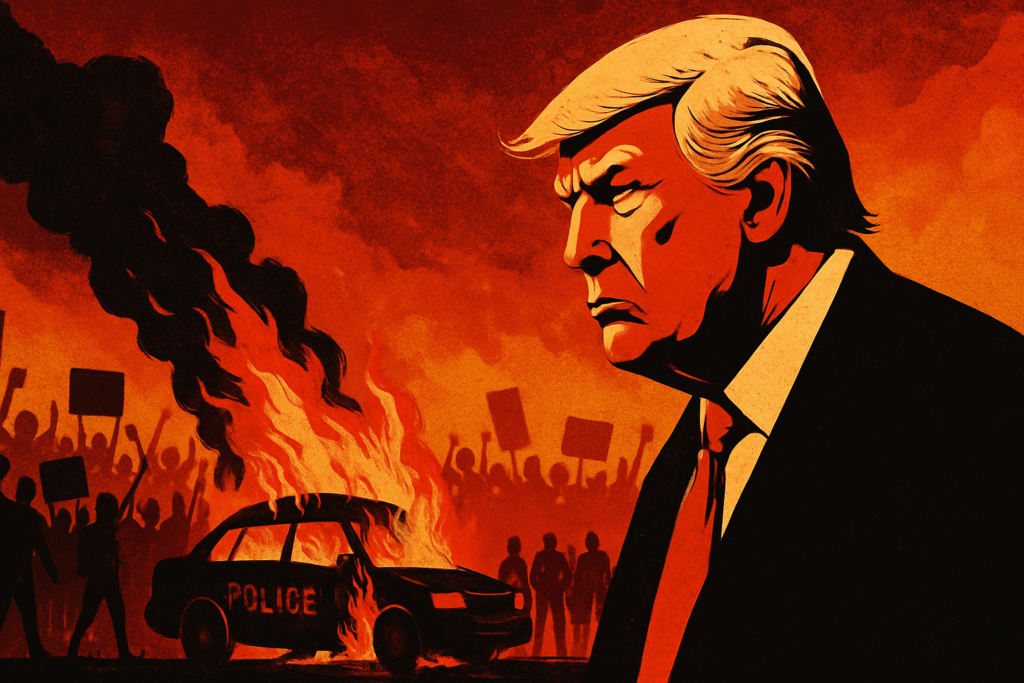President Donald Trump is intensifying his immigration crackdown in the wake of the nationwide “No Kings” protests, which saw millions of Americans take to the streets in opposition to his administration’s enforcement tactics. The White House is accelerating deportation operations, particularly in Democrat-led states, in a move that has ignited fierce political and civil resistance.
Following last weekend’s protests—estimated by organizers to have involved over five million participants—Trump has ramped up efforts to fulfill his long-standing campaign promise to reduce undocumented immigration. Critics argue the administration is targeting communities indiscriminately, sowing fear among immigrant families, disrupting neighborhoods, and escalating tensions with state leaders from California to New York.
Federal Force in Democrat-Run Cities
The administration has authorized sweeping measures, including the deployment of thousands of National Guard troops to California—despite vocal opposition from Governor Gavin Newsom. Federal agents, many masked and unidentified, have been carrying out arrests in both rural and urban areas, drawing criticism for detaining individuals with no criminal records. Over 40% of ICE detainees currently in custody fall into this category, according to government statistics.
Trump has framed the immigration issue in militaristic terms, labeling it an “invasion” and invoking wartime powers. He is pushing Congress to expand detention capacity, increase deportation flights, and fund the hiring of 18,000 new immigration enforcement personnel, including 10,000 ICE agents.
In a social media post, Trump claimed: “The American people want our cities, schools and communities to be SAFE and FREE from illegal alien crime, conflict, and chaos.”
Civil Liberties and Political Fallout
Civil rights organizations, elected officials, and former law enforcement leaders have decried the administration’s tactics. Videos of federal agents detaining immigrants without warrants and targeting peaceful protestors have drawn widespread condemnation. Protesters recently blocked ICE operations at Los Angeles’ Dodger Stadium, and cities across the country are sharing tips to protect undocumented residents.
In New York, tensions spiked after ICE agents arrested City Comptroller Brad Lander while he was escorting a defendant from immigration court. Although ICE claimed Lander assaulted an agent, video footage appears to show him being physically restrained without provocation. New York Governor Kathy Hochul condemned the arrest and warned of rising fear in immigrant communities.
The White House has not ruled out further detentions of political figures opposing the crackdown. Recent incidents have involved brief detentions or physical confrontations with federal agents targeting California Senator Alex Padilla and other members of Congress.
Undermining Trust in Law Enforcement
Law enforcement professionals are also raising alarms. Diane Goldstein, a retired California police lieutenant and now executive director of the Law Enforcement Action Partnership, said ICE’s actions are damaging community trust built over decades.
“They’re not policing in a constitutionally protected manner,” Goldstein said. “We are disappearing people. We are even arresting U.S. citizens and disappearing them, and that is not what we do.”
Local governments are taking emergency measures. In California, funding for food banks has increased as undocumented residents avoid public spaces. Nationally, resistance networks are tracking raids, sharing alerts, and advising families on their rights.
Growing National Divide
Although Trump’s overall approval rating remains at 45%, a slim majority—51%—approve of his handling of immigration, according to the NBC News/SurveyMonkey poll. Still, experts warn that broad support for aggressive tactics is fragile and could falter as more Americans witness the impact firsthand.
Professor Michael Kagan, a legal scholar and director of the immigration clinic at the University of Nevada Las Vegas, warned that Trump’s administration is pushing boundaries in an effort to test the limits of executive power. “They’re trying everything to see what they can get away with,” Kagan said.
The ACLU issued a stark warning, accusing the administration of consolidating power through fear. “We have never experienced a moment like this,” the organization said in a statement. “These attacks are transparently about consolidating power, bringing critics to heel, and eliminating the space to fight back.”
As Trump continues to pursue a hardline immigration agenda, the United States finds itself increasingly divided—between those who see the effort as restoring law and order, and those who see it as an assault on civil liberties and democratic norms.


